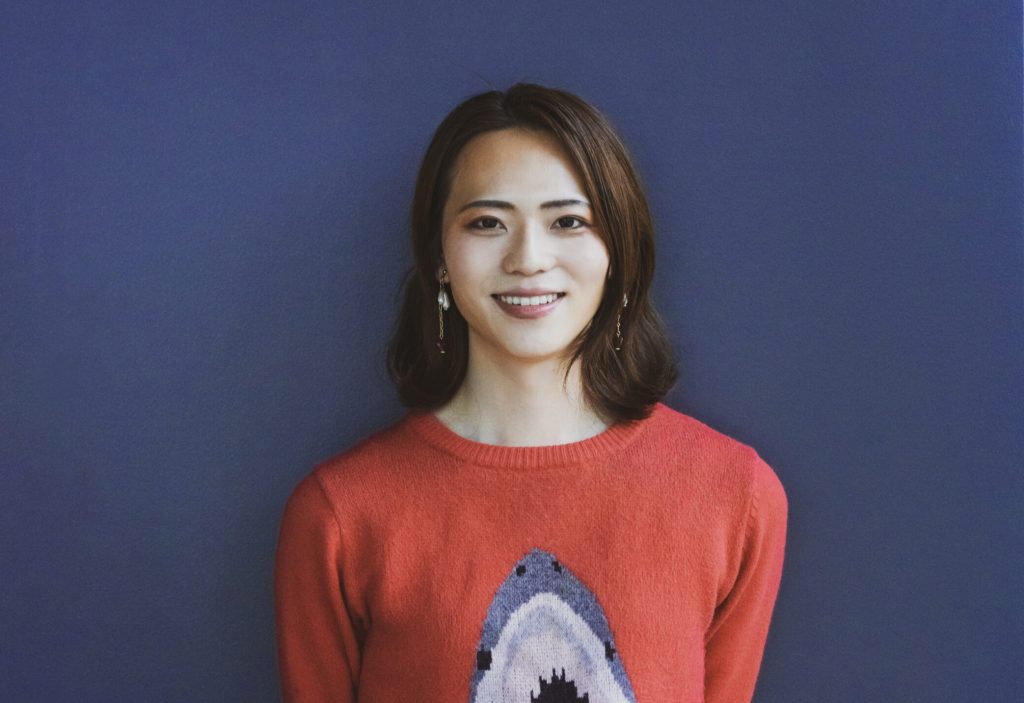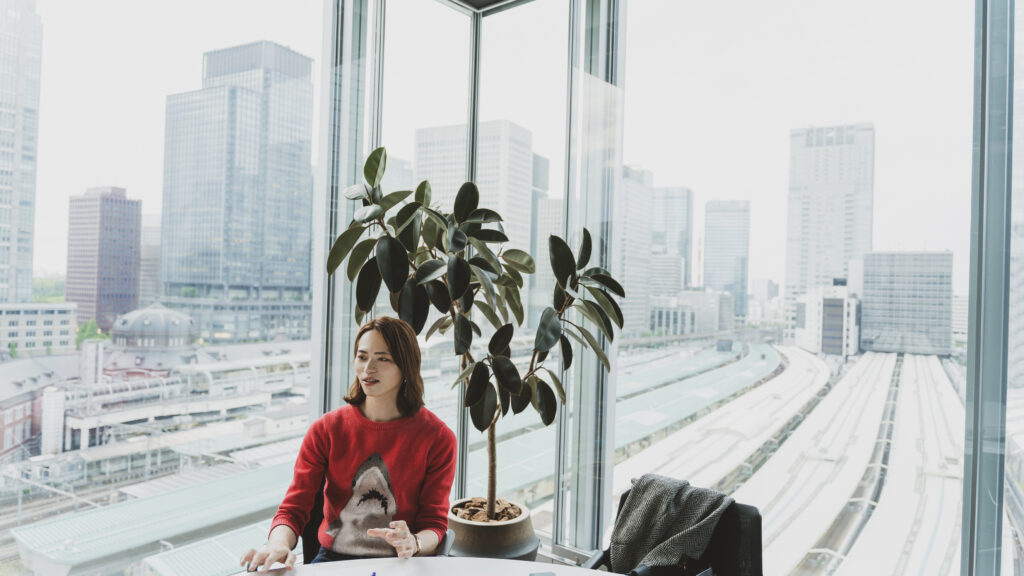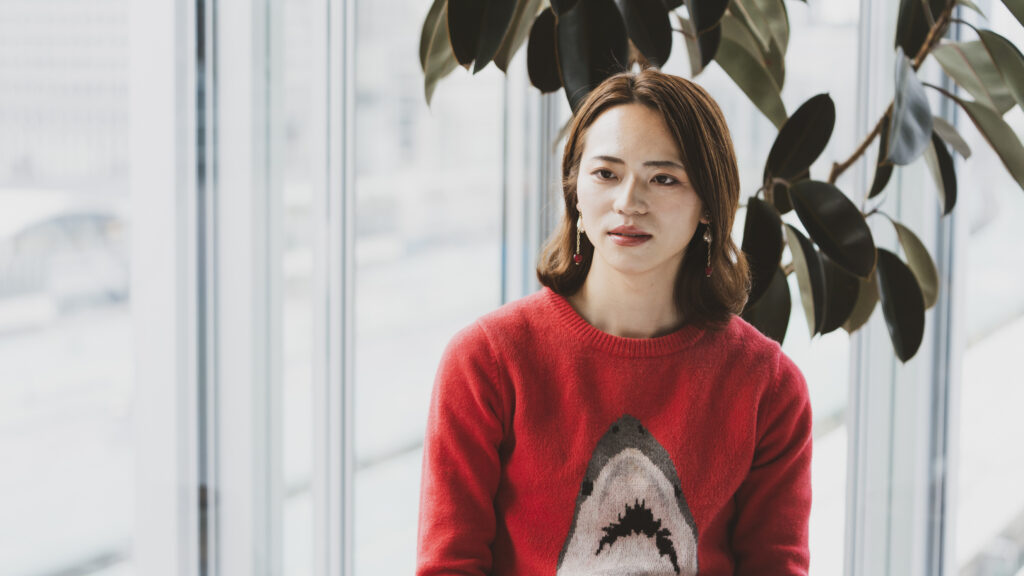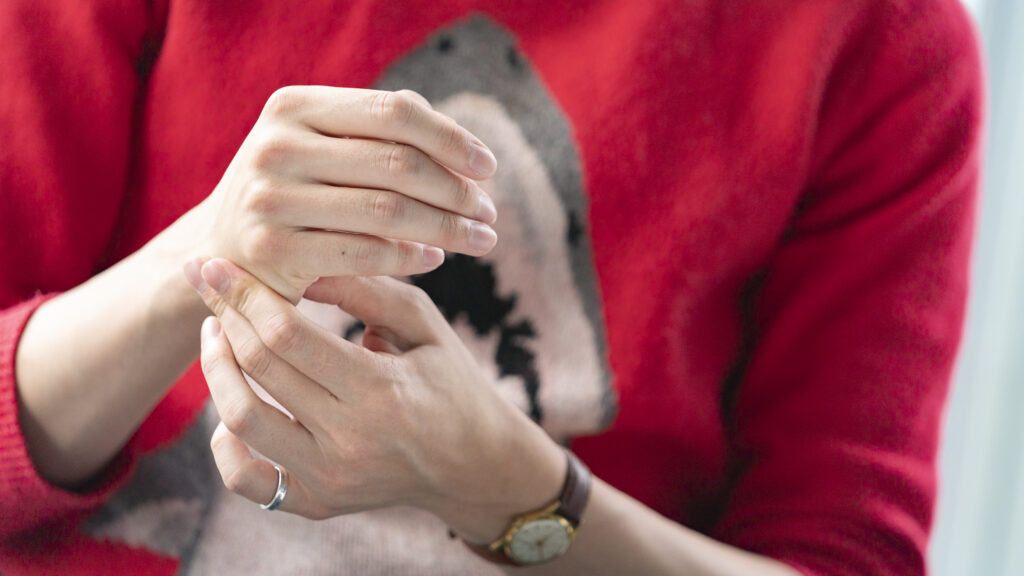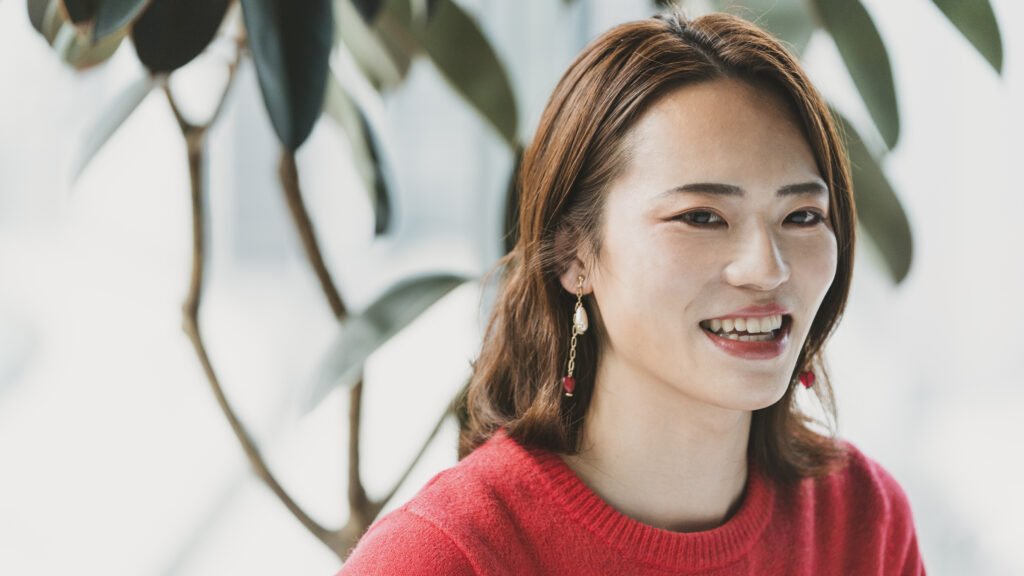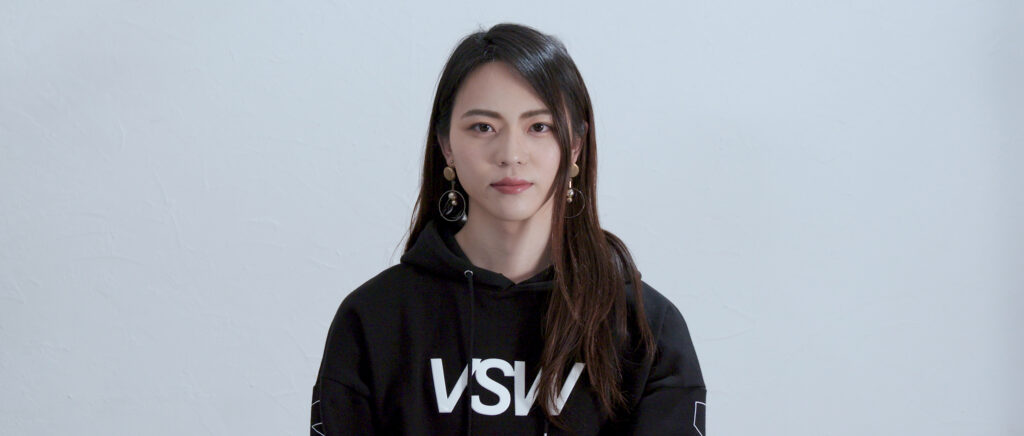Sari Kaede works across various disciplines like modeling and entertainment, as well as architecture and consulting. She transitioned while she was a graduate student at Keio University, and today, she communicates her views as a transwoman through lectures related to LGBTQIA+ issues. Her role as a model and talent is a part of such activism.
On June 19th, You decide., a documentary film depicting Sari and the people around her, will be out in movie theaters nationwide. The film includes scenes of her competing in a beauty contest for transwomen and conversations with her father about her gender identity. However, Sari doesn’t regard it as an LGBTQIA+ film. We spoke to her about what she wants to convey through it. We also asked about her ideal vision of social diversity, which she’s striving for with her activism.
——You wear many hats. What kind of work are you doing at the moment?
Sari Kaede (Sari): I work as an architectural designer and consultant for new businesses at Nikken Sekkei. Until this point, [the clients would decide] the criteria like the type of buildings and the budget before architecture agencies got to work. But now, we receive more extensive offers, where [people say] “We want to discuss with you at this phase where we decide on the type of building, budget, and construction.” I sometimes get abstract requests like, “We want to create a space for reading.”
Also, in my case, the way I work has been changing. As the person in charge of new businesses, I look for social issues and build projects from our perspective; this is how I work.
——Is most of your work pertinent to social problems?
Sari: I’ve been receiving more questions about Sustainable Development Goals (SDGs) from clients, in part, because of my identity. But in these times, corporations know it’s effective for them to work on SDGs if they wish to secure long-term profits. I’ve expanded my knowledge on SDGs through lectures, so my challenge is to see what goals we could achieve with the clients’ projects.
——It’s a good thing to raise companies’ awareness about SDGs.
Sari: Yes. However, resolving LGBTQIA+ issues isn’t a part of SDGs. The “achieve gender equality” goal is only about equality between men and women because some member states in the United Nations—who are aiming to achieve SDGs—persecute homosexuality by religion or law. I think it’s key to not only work on SDGs but to suggest what [factors] must be added into the “next SDGs.”
——You’re also a model and a talent. There’s meaning in every activity you do.
Sari: I only accept modeling jobs if I can talk about the background like, “This is why I’m in this brand’s promotional [content]” and whether it matches the context of what I want to convey. For instance, Frelsi is a high heel brand for people with bigger shoe sizes. The way they rework the molds [for shoes] and manufacture them resonated with me. Apparently, small foot sizes are the standard for shoe sizes, and in most cases, bigger sizes are just enlarged. But shoes that fit people with big feet are necessary.
I’m also on ABEMA News and make speeches at events, and I try to partake in lectures for corporations as much as possible. More corporations are conscious of how they have to take on issues regarding gender now. I get a lot of offers like, “We want to hear from LGBTQIA+ people in the workforce.”
——Although the level of awareness of corporations is higher, systems and policies still have a long way to go, yes?
Sari: It’s said that about 10% of the population is LGBTQIA+. People know about the existence of that 10%, but we still [live in] a situation where it’s hard for LGBTQIA+ people to speak up. From the corporations’ perspective, they want to ensure excellent workers and employee turnover rates, so I would like to acknowledge [their efforts]. But because we can’t see [LGBTQIA+ representation], it doesn’t feel like it’s happening. Many corporations haven’t even achieved gender equality, which society has been discussing for a long time. We’re in a transition period right now. If you ask me if people consider LGBTQIA+ issues as their own issues, I think we’re not there yet.
Everyone has an element that makes them a minority
——What questions do corporations ask you at lectures, specifically?
Sari: They ask many questions about job hunting. I break my lectures down into three parts—before I entered a company, the moment I joined a company, and the aftermath. I had already come out when I was on the hunt for a job, so I share anecdotes involving comments that hurt me then, acts of kindness, hardships I faced when I started working, and apt systems.
——People have recently been talking about job hunting for LGBTQIA+ individuals. You also had a negative experience.
Sari: I came out to a prospective employer, and they said, “I’m reluctant to make a judgment.” As a result, I didn’t apply to corporations like that. It would’ve been tough if I joined such a corporation, anyway. So, I only applied to companies that understood LGBTQIA+ people. The thing I struggled with at my current company has to do with qualifications. Whenever I deal with buildings or talk about architecture, I need to show a license with my ID photo. I realized that the other party gets confused when the content, gender, and name on the ID differ from the information they know about me. This isn’t exclusive to LGBTQIA+ people, as it’s a problem that occurs between married couples with different surnames or people who haven’t updated their license after getting married.
——Are there any difficulties with coming out?
Sari: I believe whether to come out or not is up to the individual, and it shouldn’t be systemized. People must have a safe environment for when they want to come out. The term welcoming out refers to an environment where coming out is welcomed. I hope more schools and workplaces could become welcoming out spaces.
——Having the same number of men and women in companies is seen as something important. Is it also necessary for corporations to increase the number of LGBTQIA+ employees?
Sari: It’s imperative to implement policies and support that make everyone stand on the same start line to remove barriers and inequality. For example, if working consecutively over the years is a condition in a promotion system, then the promotion of pregnant people will be delayed. To correct that, I think it’s fitting to [guarantee the] advancement of women by deciding on how many women executives there should be. However, I disagree with raising the number of women or LGBTQIA+ people as though they’ve been copied and pasted.
To begin with, I think a part of people belongs to a minority of some sort. They might become a minority someday, no matter how they believe they’re in the majority. Here’s an everyday example: you struggle at a get-together because you don’t like beer (laughs). You never know when you might feel unequal because of your minority-ness. If a particular environment handles gender equality and diversity well, then it would accept problems that other minorities face.
——If we think everybody’s a minority, then various issues will no longer be “special.”
Sari: Everyone experienced the difficulties of living an abnormal life because of covid-19. And everyone became a minority. I noticed this when we switched to working at home, but companies that handled online work well were those that had already dealt with diversity. Because they had already incorporated diverse working styles, many people had experienced working from home while raising a child. That’s why they could respond smoothly.
“… I suffered from the masculine gender role… people asked me for LGBTQIA+-ness”
——In the opening scene of your documentary film, You decide., you say, “You decide whether I’m a woman or not.” That scene was impactful.
Sari: Regardless of gender, everybody compromises between expressing themselves and the limitations [imposed on them] by society. If your company doesn’t approve, then you can’t wear the clothes you like to work, right? Likewise, for me to live authentically as a transwoman, society’s understanding is also crucial. People often debate about which bathroom transgender people should use: transwomen who have medically transitioned and changed their gender marker could use the women’s restroom, but what about other transwomen? Instead of thinking about this as individuals, we need to think about it as a society.
——You also face obstacles as a woman, yes?
Sari: I came out because I suffered from the masculine gender role. But when I opened up about my transgender identity, people starting pushing femininity onto me. Then, when I told them they’ve gotten it wrong and explained my being [a part of the] LGBTQIA+ community, people asked me for LGBTQIA+-ness. When people try to recognize others by categorizing them, they could only separate them by gender. That’s why I don’t use the word LGBTQIA+ as much anymore.
——Once issues regarding gender are resolved, then beyond that will be a society that respects individuals without categorizations.
Sari: Of course, I think the term LGBTQIA+ is necessary right now to point to those who fall outside of the cis/heteronormative definition. But there are as many genders, ways of living and thinking, and religions as the number of people. As long as you have the category of “me,” then it’s alright. What I mean is, normalization is necessary, but you don’t have to make your gender your identity.
——I heard you place importance on showing people you’re trans and live life regularly. That’s one way to show that your gender isn’t your sole identity.
Sari: Yes. I sometimes intentionally say I’m a transgender architect because it’s hard for trans people to become architects. I hope this society could become one where this kind of expression is unnecessary.
——The awareness of LGBTQIA+ people has increased, but there are still many aspects that need to be improved.
Sari: Until now, gender equality and LGBTQIA+ issues only reached LGBTQIA+ people or those interested. However, many people are outside of that discussion. Some people want to learn about the issues or situations, but there’s this pressure to show the positive side of diversity and individuality only. I would love people to come and talk to me. I want to study and converse with everyone, including those who don’t understand or relate to LGBTQIA+ issues.
——Instead of pondering, talking is essential.
Sari: Sometimes, when we don’t understand, we might be like, “I don’t understand this, and am disgusted by it.” The cause might not be within the individual but within the social structure. We could only understand this topic through conversations, so I want to update it by facing it. This isn’t just about diversity but also about SDGs. When there are goalposts like, “Let’s reduce CO2 and normalize electric cars,” sometimes it’s hard for people to question that like, “But isn’t that electricity generated by thermal power?”
——I believe You decide. will catalyze people to confront issues like that. What do you want people to feel from the film? What do you want to say to them?
Sari: I don’t think of that film as an LGBTQIA+ film. You could see me living normally by blending in at my school and company. Plus, the scenes of people around me are more impactful. Instead of showing a conclusion, authentic conflicts where the two parties can’t understand each other are shown, such as my father who can’t understand my gender. The English title, You decide., points to how I live is not only up to me—how you (society) view me plays one role in how I live. I would like to see how people are going to talk about this film.
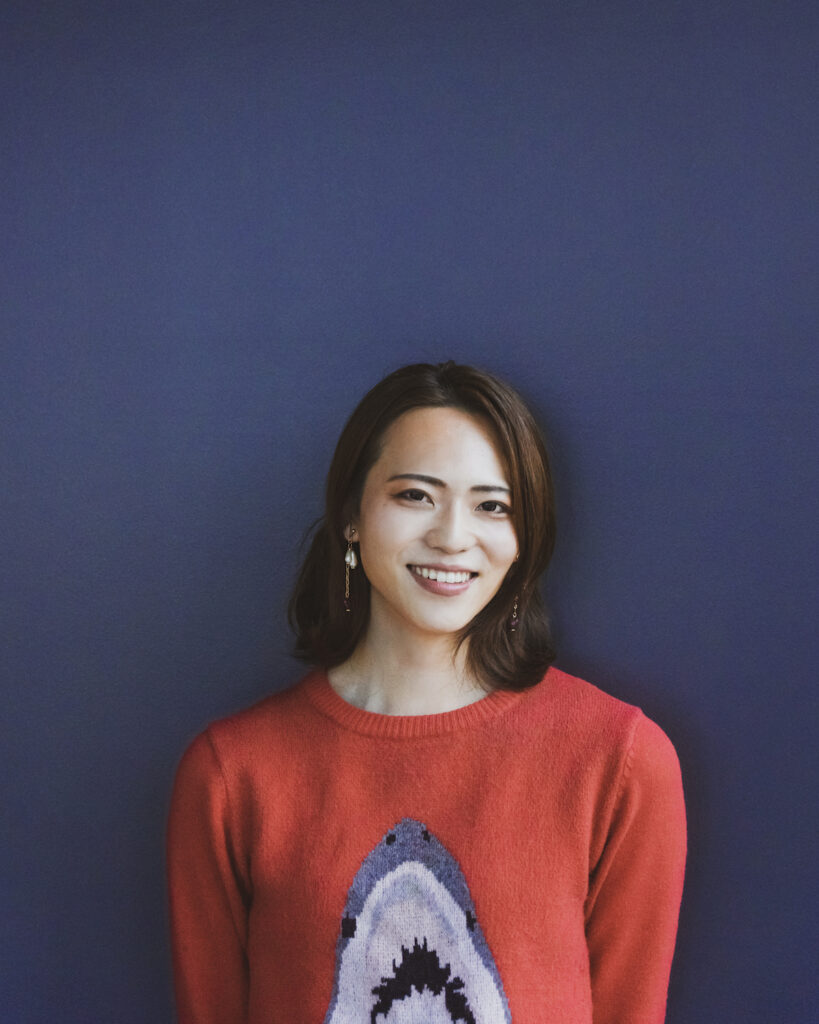
Sari Kaede
Born in Kyoto in 1993, raised in Fukuoka. As a transwoman, Sari Kaede hosts lectures regarding LGBTQIA+ topics. After graduating from architecture school, she worked at architecture agencies both inside and outside the country. Today, she mainly works on designing architecture and consulting and works in a diverse range of fields.
https://www.kaedehatashima.com/home-1
Twitter:@sari_kaede
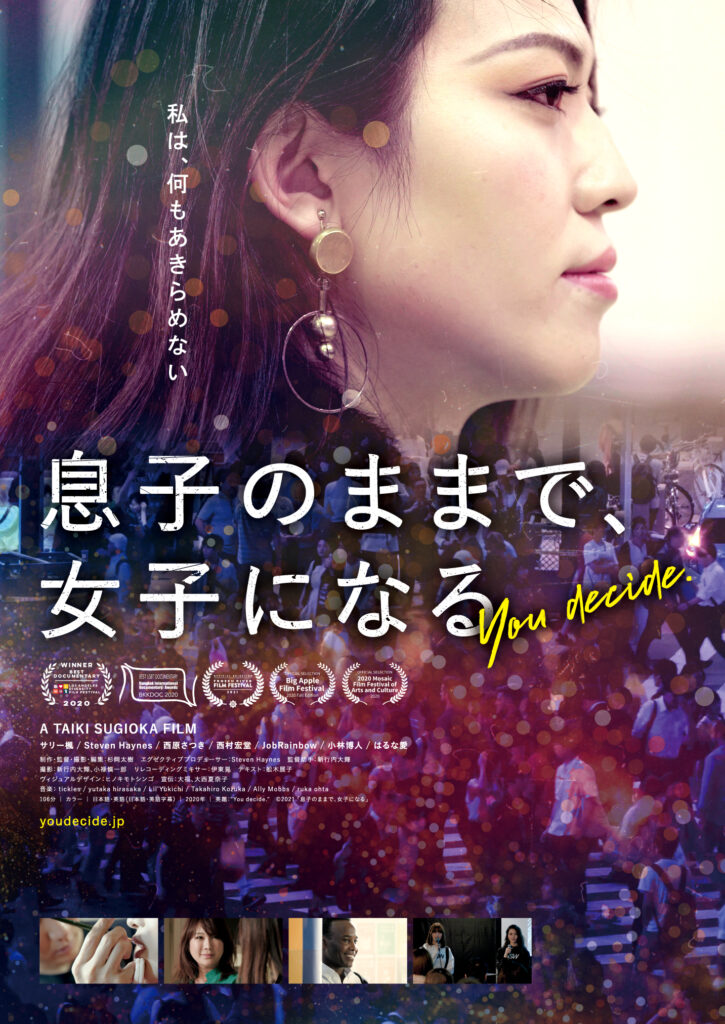
You decide.
Sari Kaede is gaining momentum as a new transwoman icon. A dream of becoming an architect, the conflict of being unable to fulfill the expectations of being a son, dialogues with family—such is her ongoing story about how she lives as her true self.
Out on June 19th, 2021 in Euro Space and other nationwide movie theaters.
https://www.youdecide.jp/en
Photography Yuri Manabe
Translation Lena Grace Suda

